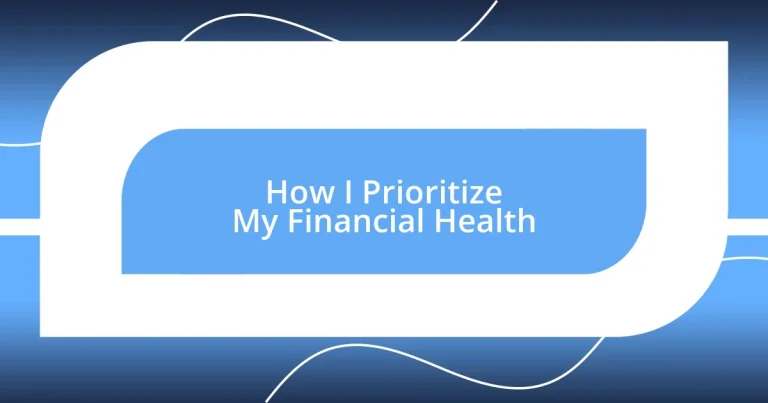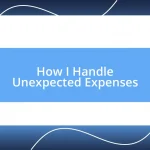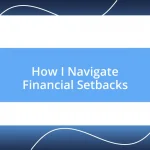Key takeaways:
- Setting realistic financial goals, such as building an emergency fund, provides security and empowers personal financial journeys.
- Regularly assessing financial situations and tracking expenses helps ensure alignment with core values and long-term aspirations.
- Consistent review of financial progress allows for adjustments, goal-setting, and cultivating a mindset of preparedness for future uncertainties.

Understanding Financial Health Goals
Understanding financial health goals starts with knowing what truly matters to you. For instance, when I first began my journey, I realized that it wasn’t just about saving money; it was about creating a life that aligns with my values. Have you ever stopped to think about what your financial goals say about your dreams?
I remember vividly the moment I set my first realistic goal: building an emergency fund. It was a simple target, yet the peace of mind it provided during unexpected circumstances was invaluable. Each time I added to that fund, I felt a little more secure and empowered. It made me question—what small steps can you take that will radically change how you view your financial future?
As I delved deeper into my financial health goals, I discovered that they could shift over time, reflecting changes in my priorities. It’s essential to regularly reassess your goals—what worked last year might not suit your current stage of life. Isn’t it freeing to think that our financial journeys can evolve, just like we do?
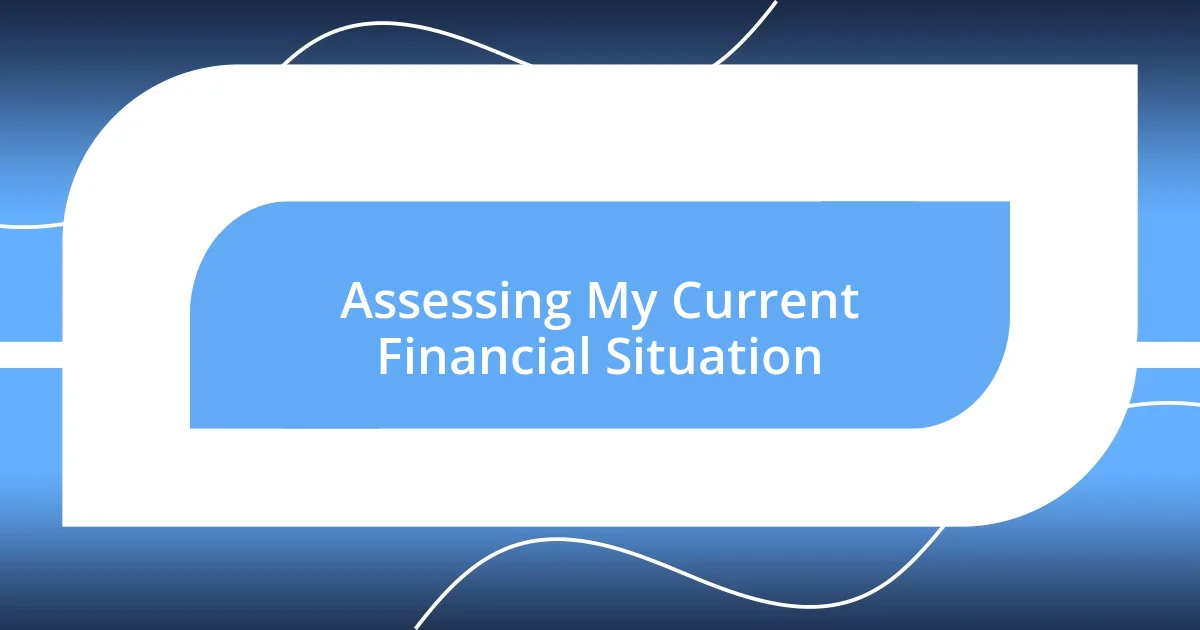
Assessing My Current Financial Situation
Assessing my current financial situation has always felt a bit like taking a health check-up—necessary but sometimes daunting. Initially, I pulled together my financial documents and really looked at my income, expenses, and savings. I remember feeling a mix of anxiety and liberation, as each number revealed a piece of the bigger picture. It was eye-opening to see how my spending aligned—or misaligned—with my core values and goals.
To break it down clearly, here are some key steps I took when assessing my financial situation:
- Gathered All Financial Documents: Pay stubs, bank statements, and bills gave me a comprehensive overview.
- Listed Monthly Income and Expenses: This let me see exactly where my money was going each month.
- Identified Debts: Including credit cards and loans, understanding the total amount owed was crucial.
- Calculated Savings and Investments: I wanted to know exactly what I had saved and where my investments were allocated.
- Evaluated Financial Goals: Understanding what I wanted for the future—like buying a home or traveling—helped me see if my current situation matched those desires.
Taking these steps brought clarity. It’s not just about the numbers, but about defining a path that propels me toward the life I envision.
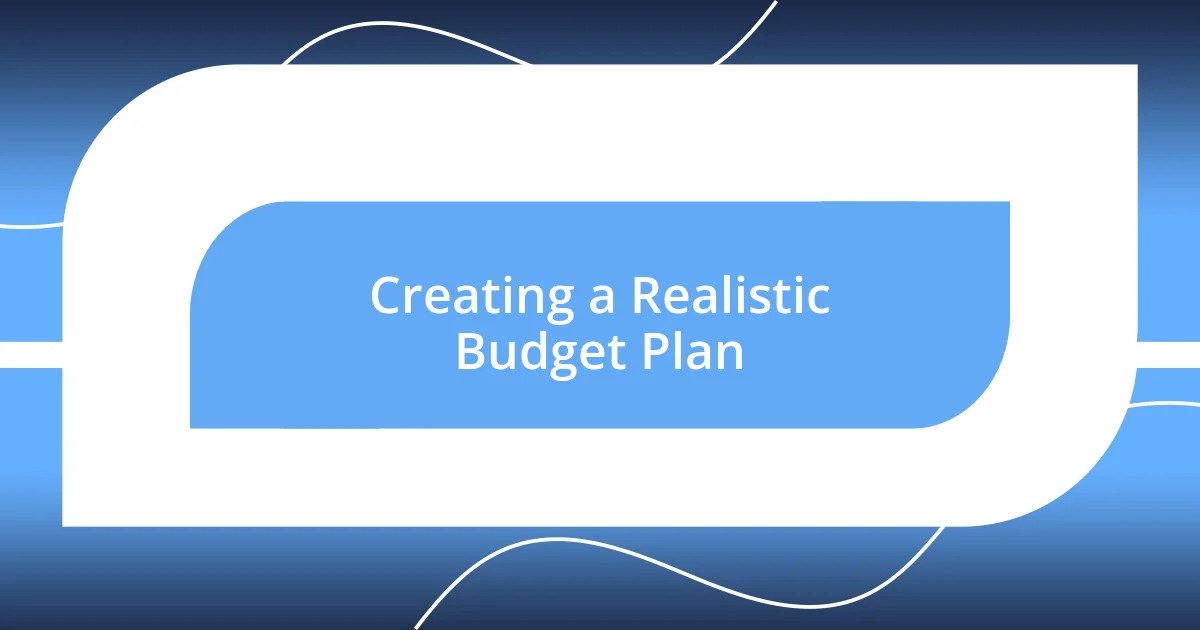
Creating a Realistic Budget Plan
Creating a realistic budget plan has been a game changer for my financial journey. I started by tracking my expenses for a month, which brought clarity and a few surprises—I never realized how those daily coffee runs added up! This exercise taught me that even small expenses can impact my overall financial health. Have you noticed anything similar in your spending?
Next, I prioritized my essential expenses, like housing and utilities, and made sure to set aside savings before addressing discretionary spending. I recall adjusting my budget to allow for a small entertainment fund, which gave me the freedom to enjoy outings without guilt. It may feel limiting at first, but when you allocate funds wisely, you’ll find that balancing necessities with enjoyment is entirely possible.
After crafting my initial budget, I made it a habit to review it monthly. Personally, I found this step essential; it allowed me to tweak and adjust my spending as my lifestyle changed. Sometimes a surprise expense comes up, and I’ve learned that flexibility is crucial. By reviewing my budget regularly, I stay on track and feel more in control of my financial health.
| Expense Type | Example |
|---|---|
| Essential Expenses | Rent, utilities, groceries |
| Discretionary Spending | Dining out, entertainment |
| Savings | Emergency fund, retirement |
| Debt Repayment | Credit card bills, loans |
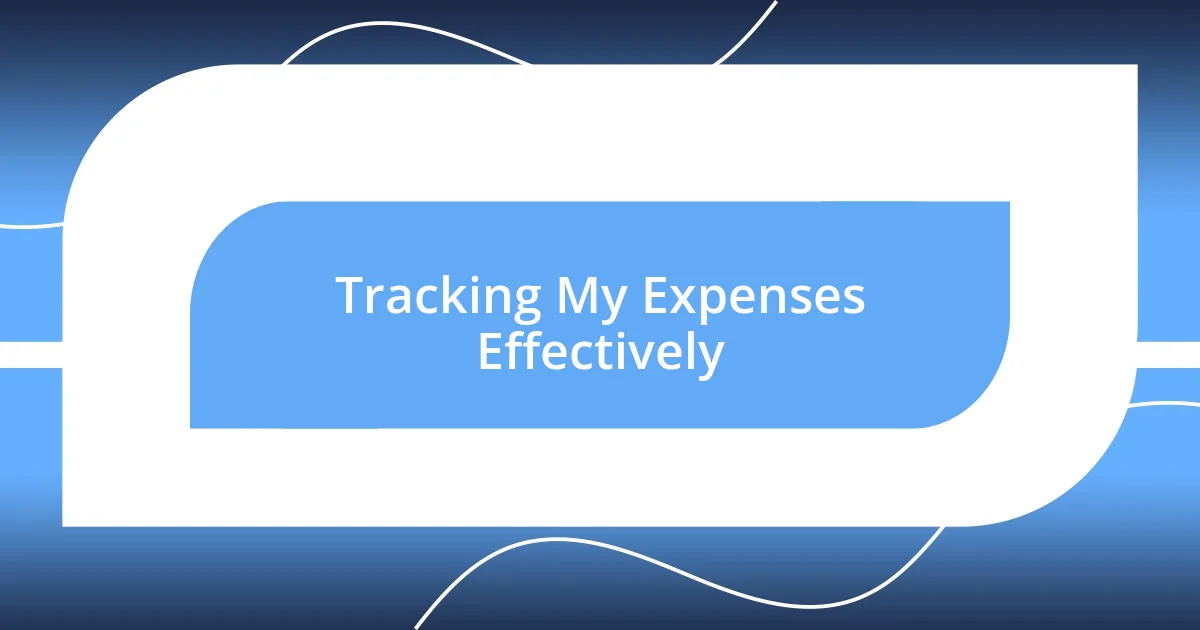
Tracking My Expenses Effectively
Tracking my expenses effectively transformed the way I view my finances. At first, I thought it would be a tedious task, but I found it truly enlightening. I started using a simple app to log every transaction, and it was surprising to see patterns emerge. Each time I hit “publish” on a new entry, I felt a sense of accountability blossom within me. Have you ever tried something new that ended up reshaping your habits in unexpected ways?
As I continued tracking, I made it a point to categorize my expenses. I’d have categories like groceries, entertainment, and even “guilty pleasures” like impulse buys. One month, I discovered I was spending more on takeout than I had anticipated which prompted me to experiment with cooking at home. Not only did I save money, but I also rekindled my passion for cooking, making it a fun family activity. It was amazing how this single observation encouraged a positive shift in my lifestyle.
To maintain my focus, I reviewed my spending weekly. This routine became more than just a chore; it was like a financial check-in for me. I felt an immense sense of relief and clarity whenever I noticed expenses that were creeping up. That little voice in my head would nudge me, reminding me of my financial goals whenever I thought about indulging in an unnecessary purchase. Are you aware of how your spending aligns with your long-term aspirations? The more you track, the more aligned you’ll likely become.
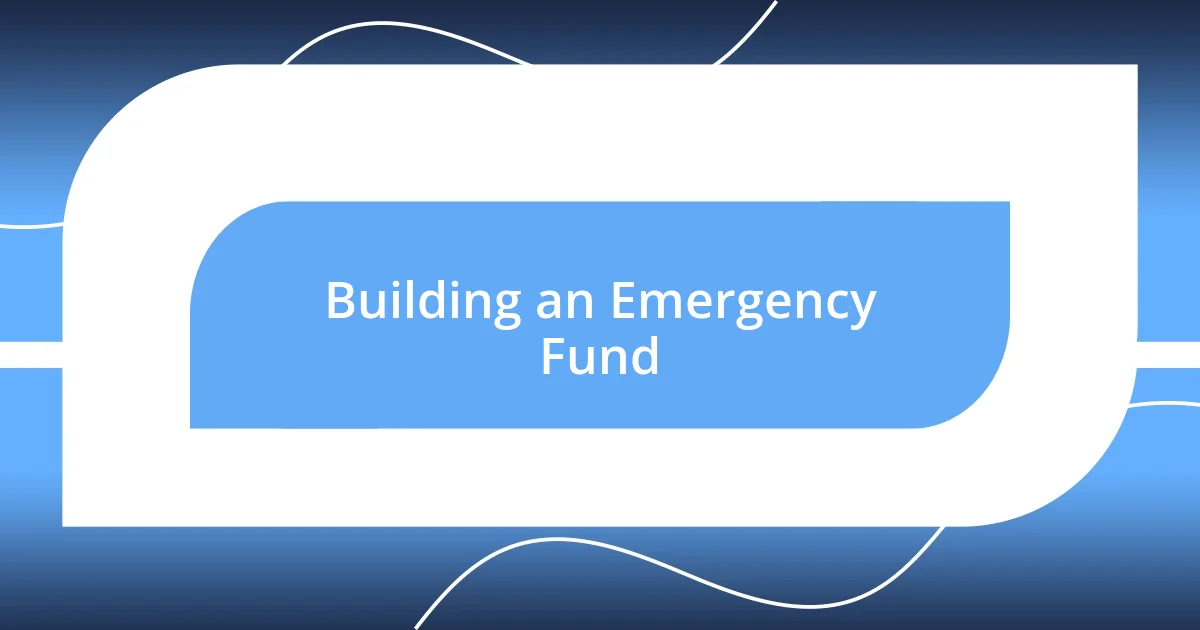
Building an Emergency Fund
Building an emergency fund was one of those “aha” moments in my financial journey. I distinctly remember the first time I set a goal of saving six months’ worth of expenses. It felt daunting, like climbing a mountain—but I realized that starting small made it manageable. I committed to just $50 a month at first, which was doable. Have you ever found that breaking a big goal into smaller, achievable parts makes it less intimidating?
Slowly, I began to see my emergency fund grow. Each deposit felt like a safety net being woven tighter. I recall the comfort I felt when unexpected expenses—like a sudden car repair—came up. Instead of panicking, I confidently used my fund, knowing I had prepared for this moment. It was empowering to realize that I had control over my financial future. What would it feel like to be prepared for life’s uncertainties?
Reflecting on my journey to build this fund, I learned the power of consistency over perfection. Some months I could save more than others, but I never lost sight of my goal. I often remind myself that every little bit counts. It’s not just about hitting a perfect target but about creating a mindset of preparedness. When you think about your financial health, what steps can you take to ensure you’re ready for those unexpected turns?
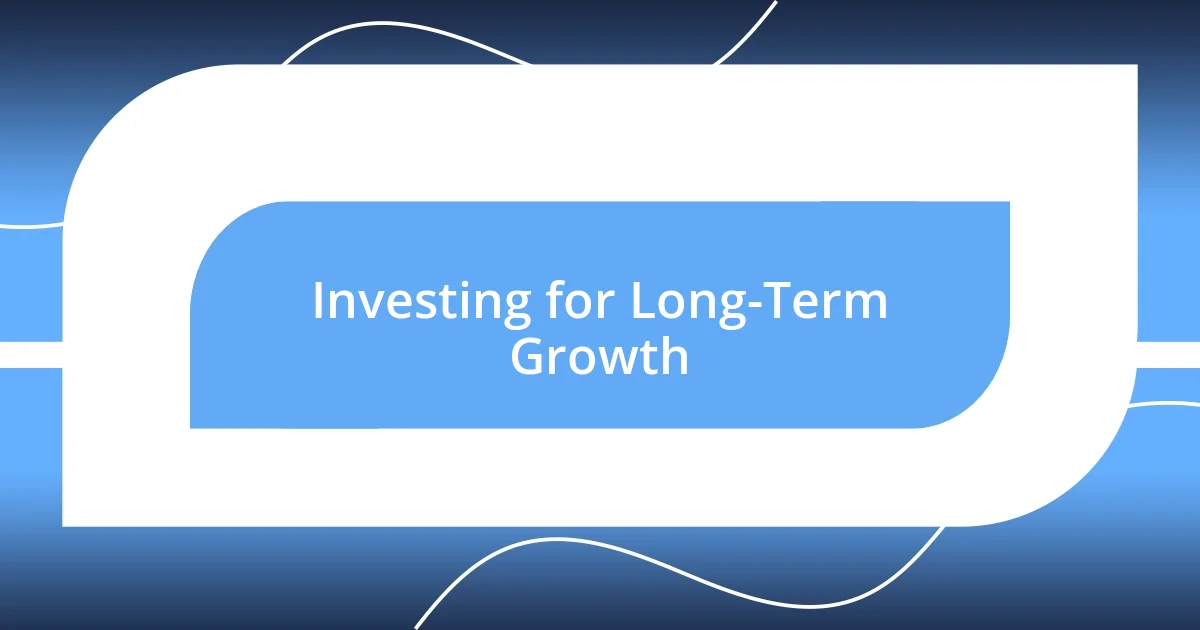
Investing for Long-Term Growth
Investing for long-term growth has always been a focal point of my financial strategy. Initially, I was hesitant to part with my money for something I wouldn’t see immediate results from. But the first time I bought shares in a company I believed in, I felt a rush of excitement and ownership. Have you ever felt that thrill when you put your money into something you’re passionate about?
Seeing those initial investments grow over time was like watching a garden flourish after careful planting. I remember the first substantial dividend payment I received, and it felt like a small but powerful reward for my patience. This experience taught me that investing isn’t just about numbers; it’s about nurturing potential and watching it bloom. What if your investments could one day create a future that’s not just stable but thriving?
By consistently contributing to my investment accounts, I’ve found a sense of discipline that spills over into other areas of my life. It’s become less of a financial obligation and more of a personal commitment. Every time I review my portfolio, I feel proud of the growth, knowing I’ve built a foundation for my future. I often ask myself, how can I advance my growth even further? The answer lies in continuing to educate myself and seize opportunities, which keeps me both engaged and motivated.
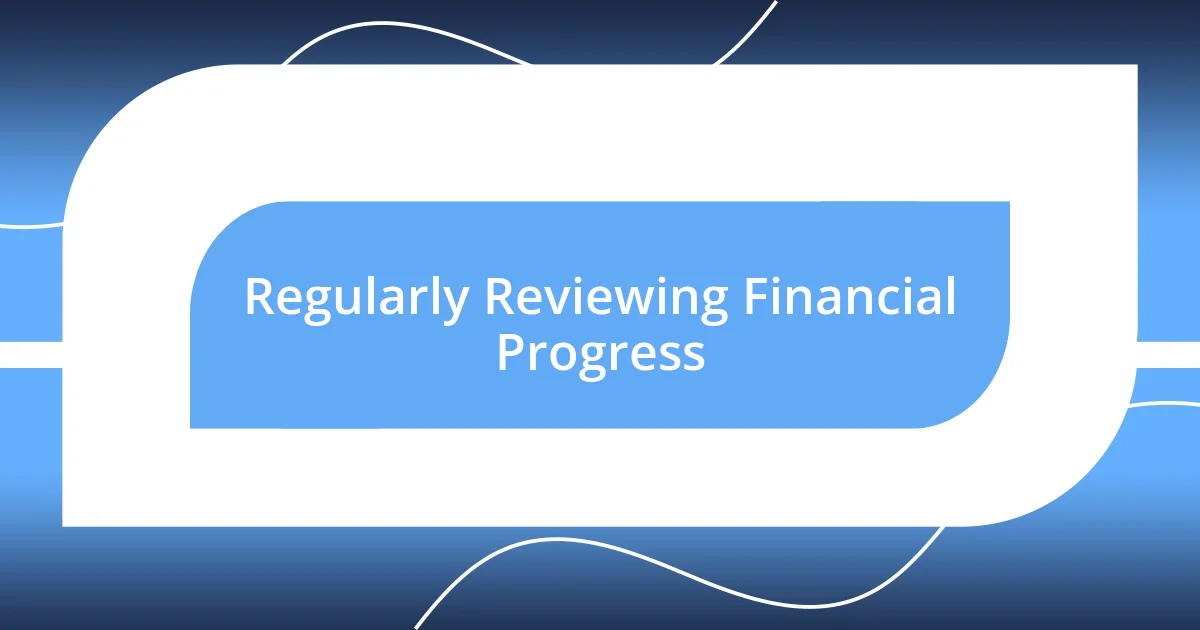
Regularly Reviewing Financial Progress
Regularly reviewing my financial progress has become one of the cornerstones of my financial health. I remember the first time I sat down with my statements; it was an eye-opening experience. I was startled to see how much I had spent in certain areas, and it made me question my priorities. Have you ever looked back at your spending and felt a mix of disbelief and realization about where your money is going?
Each month, I carve out time to assess not just my expenses but my savings and investments too. This practice feels like giving my finances a routine check-up. I often discover small victories—like a reduction in my dining-out expenses—and celebrating these helps keep me motivated. It’s similar to training for a marathon; you don’t just run and hope for the best; you track your distances, your times, and adjust your training accordingly. What small adjustments could lead to significant improvements in your financial journey?
I also take the opportunity to set new goals during these reviews. Like when I identified a pattern in my spending habits; I realized I was overspending on subscriptions I rarely used. So, I took action to cut those out, freeing up funds for more meaningful investments. This cycle of reflection and adjustment creates a sense of empowerment, reminding me that I have the ability to shape my financial future. How often do you take the time to reevaluate your own finances, and what insights might you gain from doing so?












